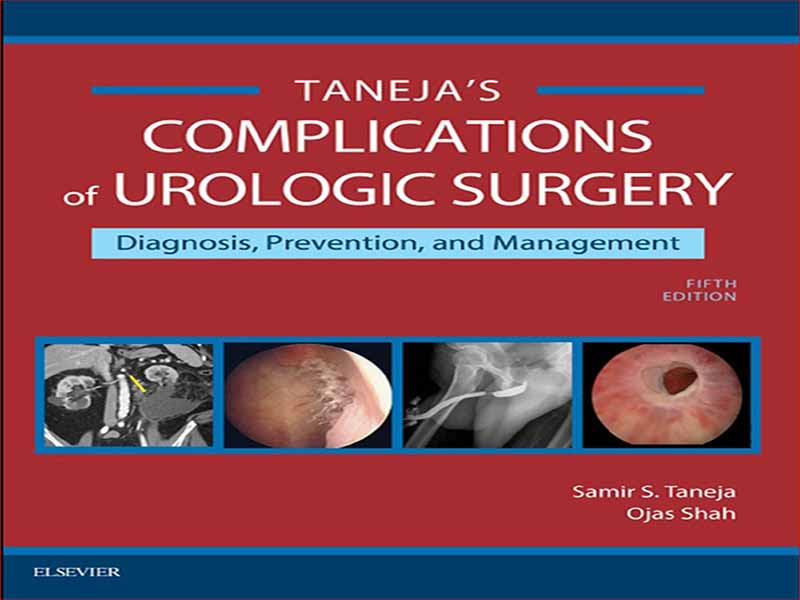- عنوان کتاب: Taneja’s Complications of Urologic Surgery
- نویسنده: Samir S. Taneja
- حوزه: ارولوژی
- سال انتشار: 2018
- تعداد صفحه: 1037
- زبان اصلی: انگلیسی
- نوع فایل: pdf
- حجم فایل: 27.0 مگابایت
جراحی هرگز کامل نیست، اما این نباید مانع از کمال جویی جراح شود. از بسیاری جهات، این ماهیت یک حرفه جراحی است – اصلاح مداوم رویکرد و تکنیک فرد از طریق مشاهده، آزمون و خطا، و تجربه. با انجام این کار، نتایج عالی را می توان با هر عملی به دست آورد، و در صورت بروز عوارض، تشخیص زودهنگام و مدیریت مناسب می تواند باعث بهبودی سریع شود. بهینه سازی نتایج جراحی را می توان به عنوان یک تمرین مادام العمر برای جراح در نظر گرفت، اما برای هر بیمار تنها یک نتیجه مهم است. اگرچه برای جراح پرمشغله آسان است که هر عملی را به عنوان یک روتین در نظر بگیرد، اما ضروری است که هر عمل، مهم نیست که چقدر معمولی است، مهم و دارای نتایج بالقوه تغییر دهنده زندگی برای بیمار است. تعادل بین اعتماد به نفس و غفلت برای جراحان باریک است و فروتنی به جراح کمک می کند تا تشخیص دهد که جراح چقدر خوب یا با تجربه باشد، عوارض اجتناب ناپذیر است. حتی جراحی که به نظر می رسد خوب پیش می رود، در یک بیمار سالم، می تواند منجر به عارضه شود. هنگام برنامه ریزی یک عمل، در نظر گرفتن عوامل میزبان منحصر به فرد که بیمار را مستعد عوارض می کند ضروری است. با افزایش تجربه، جراح مواردی را که در آنها جراحی توصیه نمی شود، تشخیص می دهد. اغلب اوقات، در اوایل کار جراح، عوارض ناشی از انتخاب یا آمادگی ضعیف بیمار، یا توجه ناکافی به عوامل خطر در برنامه ریزی روش ایجاد می شود. بیماران مبتلا به اختلال قلبی ریوی زمینه ای، دیابت، انعقاد خون یا چاقی مرضی باید در معرض بالاترین خطر عوارضی در نظر گرفته شوند که بهبودی را به تاخیر می اندازد یا از آن جلوگیری می کند. به ویژه، بیماران چاق هم خطر عوارض ناشی از بیماری زمینه ای پزشکی و هم عوارض مربوط به افزایش دشواری فنی این روش را دارند. به همین ترتیب، روشهای عمل مجدد میتوانند چالشها و خطرات فنی منحصر به فردی را به همراه داشته باشند. هنگام شروع کار، شناخت این چالش ها و در نظر گرفتن ارجاع به یک جراح با تجربه با این نوع بیماران، می تواند درد و رنج زیادی را برای جراح و بیمار حفظ کند. در حالی که احتیاط ضروری است، جراحان نیز باید مایل به انجام موارد چالش برانگیز در زمانی که بیماران نیاز مطلق به مراقبت دارند، باشند. ارزیابی دقیق قبل از عمل، برنامه ریزی عمل، مشاوره در صورت لزوم و رعایت اصول اساسی جراحی بهترین فرصت را برای یک نتیجه خوب فراهم می کند. در صورت مواجهه با عارضه، جراح باید از تلاش برای به حداقل رساندن مشکل خودداری کند و از یک رویکرد عاقلانه برای تعیین مسیر صحیح استفاده کند. اول و مهمتر از همه، عوارض عوارض روحی و جسمی فوقالعادهای بر بیماران ما وارد میکنند، و جراحان باید این را در هنگام مواجهه با یک عارضه به خاطر بسپارند. برای بیمار، روند جراحی به گونه ای است که کنترل آن به طور کامل به جراح داده می شود. عدم قطعیت نتیجه، از دست دادن کنترل و ترس از مرگ و میر، حتی در شرایط یک جراحی بدون عارضه برای بیمار بسیار استرس زا هستند. هنگامی که عوارض ایجاد می شود، این استرس ها بزرگ می شوند و بیماران و خانواده های آنها اغلب گیج، افسرده یا عصبانی می شوند. نشان دادن همدلی و همدردی صمیمانه بسیار مهم است. برقراری ارتباط دقیق، آرام و همه جانبه ضروری است تا آنها بتوانند ماهیت عارضه، علل و پیامدهای احتمالی آن و نگرانی های آینده را درک کنند. معیارهای خاص برای بهبود میتواند به بیمار و خانواده اجازه دهد تا روندی ساختاریافته را برای کنار آمدن ذهنی با شرایط فراهم کند. بیماران مبتلا به عوارض اغلب می ترسند که جراح آنها را رها کند، و اطمینان خاطر می تواند راه طولانی در حفظ یک رابطه خوب کمک کند. نگرانی های فیزیکی در زمینه عوارض به توانایی بیمار در تحمل استرس ها و خطر نسبی بستری طولانی مدت در بیمارستان مربوط می شود. در بیمارانی که از قبل شرایط همبودی دارند، توجه دقیق به مدیریت فرآیندهای بیماری زمینهای، بهویژه آنهایی که بر بهبودی تأثیر میگذارند، به جلوگیری از عوارض ثانویه کمک میکند. حفظ تغذیه، جلوگیری از عفونت، و نظارت دقیق بر مایعات و الکترولیتها، اصول اساسی جراحی هستند که مستقیماً بر بهبودی پس از اکثر روشها تأثیر میگذارند، اما میتوان آنها را به راحتی در گرماگرم عوارض استرسزا فراموش کرد. اگرچه همه بیماران از عوارض بهبود نمی یابند، اما هدف اصلی جراح باید بهینه سازی وضعیت بیمار برای به حداکثر رساندن شانس بهبودی بیمار باشد. تعادل بین عمل و عدم عمل برای جراحان مشکل است. تمایل اساسی برای از بین بردن یک عارضه اغلب منجر به تصمیمی عجولانه برای اقدام سریع از طریق جراحی مجدد یا مداخله می شود. اگرچه گاهی اوقات نشان داده می شود، تصمیمات سریع برای مداخله اغلب منجر به بدتر شدن مشکل یا ایجاد عوارض ثانویه می شود.
Surgery is never perfect, but that should not stop a surgeon’s pursuit of perfection. In many ways, this is the nature of a surgical career – continually refining one’s approach and technique through observation, trial and error, and experience. In doing so, excellent outcomes can be achieved with any operation, and when complications arise, early recognition and proper management can allow expeditious recovery. Optimizing surgical outcomes can be viewed as a lifelong exercise for the surgeon, but for the individual patient, only one outcome matters. Although it is easy for the busy surgeon to consider any operation as routine, it is essential to view each procedure, no matter how routine, as important and carrying potentially life-altering results for the patient. The balance between confidence and neglect is narrow for surgeons, and humility serves the surgeon well in recognizing that no matter how good or experienced the surgeon is, complications are inevitable. Even the operation that appears to go well, in an otherwise healthy patient, can result in complication. When planning an operation, consideration of unique host factors predisposing the patient to complication is essential. With increasing experience, the surgeon will recognize those cases in which surgery is ill advised. Too often, early in a surgeon’s career, complications arise through poor patient selection or preparation, or inadequate attention to risk factors in planning the procedure. Patients with underlying cardiopulmonary compromise, diabetes, coagulopathy, or morbid obesity should be considered at highest risk of complications delaying or preventing recovery. In particular, obese patients carry both the risk of complications due to underlying medical disease and those related to the increased technical difficulty of the procedure. Likewise, re-operative procedures can carry unique technical challenges and risks. When starting out, recognition of these challenges, and consideration of referral to a surgeon experienced with those types of patients, can save a great deal of anguish for surgeon and patient. While caution is essential, surgeons must also be willing to take on challenging cases when patients are in absolute need of care. Careful preoperative assessment, operative planning, consultation when appropriate, and adherence to fundamental surgical principles allow the best opportunity for a good outcome. When confronted with a complication, the surgeon must refrain from efforts to minimize the problem and use a judicious approach to determine the right course. First and foremost, complications take a tremendous emotional and physical toll on our patients, and surgeons must remember this when confronted with a complication. For the patient, the process of surgery is one in which control is given completely to the surgeon. The uncertainty of outcome, the loss of control, and the fear of mortality are tremendously stressful for the patient even in the setting of an uncomplicated surgery. When complications arise, these stresses are magnified and patients and their families are often confused, depressed, or angry. Demonstration of sincere empathy and sympathy are critically important. Careful, calm, and comprehensive communication are essential to enable them to understand the nature of the complication, its probable causes and outcomes, and concerns going forward. Specific benchmarks for improvement can allow the patient and family a structured process to mentally cope with the situation. Patients with complications often fear the surgeon will abandon them, and reassurance can go a long way toward maintaining a good relationship. Physical concerns in the setting of complications relate to the patient’s ability to tolerate the stresses and the relative risk of prolonged hospitalization. In patients with preexisting comorbid conditions, careful attention to management of underlying disease processes, particularly those influencing recovery, will help in avoiding secondary complications. Maintaining nutrition, preventing infection, and carefully monitoring fluids and electrolytes are fundamental surgical principles that directly affect recovery from most procedures, but that can easily be forgotten in the heat of stressful complication. Although not all patients recover from complications, the surgeon’s primary goal must be to optimize the patient’s condition to maximize the patient’s odds of recovery. The balance between action and inaction is a difficult one for surgeons. An underlying desire to make a complication go away often leads to a hasty decision to act quickly through reoperation or intervention. Although sometimes indicated, quick decisions to intervene often result in worsening of the problem or development of secondary complications.
این کتاب را میتوانید از لینک زیر بصورت رایگان دانلود کنید:




































نظرات کاربران